
The Power of Ashwagandha: Benefits, Uses, and Science-Backed Evidence
In recent years, ashwagandha has emerged as one of the most popular adaptogens in the wellness world. Known for its extensive benefits for both mental and physical health, this herb has been used for centuries in traditional Ayurvedic medicine. Today, scientific studies are beginning to back up these ancient claims, making ashwagandha a subject of intense interest for those seeking natural ways to improve health and well-being.
In this blog, we’ll dive into what ashwagandha is, its major benefits, and some of the recent studies that substantiate its incredible potential.
What is Ashwagandha?
Ashwagandha, scientifically known as Withania somnifera, is an evergreen shrub native to Asia and Africa. Its name in Sanskrit translates to “smell of the horse,” hinting at its unique smell and perhaps also its ability to bestow strength and vitality. Classified as an adaptogen, ashwagandha helps the body manage stress by regulating hormonal responses. This powerful herb has been a staple in Ayurvedic medicine for thousands of years, often recommended for improving overall health, promoting longevity, and balancing bodily functions.
Key Health Benefits of Ashwagandha
1. Reduces Stress and Anxiety
One of the most well-known benefits of ashwagandha is its ability to reduce stress and anxiety. It’s believed to work by modulating the hypothalamic-pituitary-adrenal (HPA) axis, the system responsible for our stress response. A study published in the Indian Journal of Psychological Medicine found that individuals who took 300 mg of ashwagandha extract twice daily experienced a significant reduction in stress compared to a placebo group. The study revealed that ashwagandha could reduce cortisol (the body’s primary stress hormone) by up to 28%. Improves Cognitive Function Ashwagandha has been shown to benefit brain health, particularly in enhancing memory, attention, and cognitive speed. In a randomized, double-blind study, participants who took ashwagandha extract demonstrated significant improvements in cognitive and psychomotor performance compared to the placebo group. The study suggests that ashwagandha may protect brain cells from degeneration, likely due to its antioxidant properties, making it a promising supplement for cognitive health .
s Physical Endurance and Strength
For athletes and those with physically demanding lifestyles, ashwagandha may enhance endurance and muscle strength. A study published in the Journal of the International Society of Sports Nutrition found that participants who took ashwagandha showed significant gains in muscle strength and size compared to the placebo group. The ashwagandha group also exhibited higher endurance and faster muscle recovery after workouts .
4. Supporealth
Ashwagandha has a beneficial impact on cardiovascular health. It has been shown to lower cholesterol and triglyceride levels, two key factors in heart health. In one 60-day study involving chronically stressed adults, the group that took the highest dose of ashwagandha had a 17% decrease in LDL (bad) cholesterol and an 11% reduction in triglycerides. By lowering these levels, ashwagandha may help reduce the risk of heart disease .
5. Helps Regulate r Levels
For individuals with high blood sugar or diabetes, ashwagandha may help to keep blood sugar levels under control. Research published in the International Journal of Ayurveda Research indicates that ashwagandha can improve insulin sensitivity and regulate blood glucose. This is especially promising for people with Type 2 diabetes or those at risk of developing it, as it offers a natural way to support metabolic health .
The Science Behind Ashwey Studies
-
Stress Reduction and Mood Support: A 2012 study published in The Indian Journal of Psychological Medicine analyzed the impact of ashwagandha on stress in a group of chronically stressed adults. The study found that 600 mg of ashwagandha daily significantly lowered cortisol levels, demonstrating its potential to combat stress-related disorders .
-
Cognitive Health: A clinical trial n Phytotherapy Research examined the impact of ashwagandha on cognitive function. The study concluded that ashwagandha root extract, taken at 300 mg twice daily, enhanced cognitive abilities such as memory and attention in people with mild cognitive impairment. This indicates its potential as a supportive supplement for those at risk of cognitive decline .
-
Physical Performance: In 2015, The Journal of the International Society of Sports Nutrition (JISSN) published a study involving 57 men who performed resistance training for eight weeks. Half took ashwagandha, and half took a placebo. The ashwagandha group showed significantly greater improvements in strength, muscle size, and endurance, with faster recovery post-exercise .
How to Use Ashwagandha Safely
Commonly recommended guidelines include:
- Starting small: Begin with a lower dose and gradually increase as your body adapts.
- Consistency: For best results, take ashwagandha consistently over several weeks or months, as many benefits accumulate over time.
- Combining with other adaptogens: Ashwagandha works synergistically with other adaptogens like rhodiola and holy basil, amplifying the effects on stress and mental clarity.
Potential Side Effects and Considerations
While ashwagandha is generally considered safe, some individuals may experience mild side effects, such as digestive upset or drowsiness. Pregnant or breastfeeding women should avoid ashwagandha, as should people with autoimmune disorders unless directed by a healthcare provider.
Additionally, ashwagandha may interact with certain medications, especially those for thyroid issues or immunosuppressants. Always check with a healthcare professional before adding any new supplement to your routine.
Conclusion
Ashwagandha offers a wide array of health benefits, from reducing stress and enhancing mental clarity to boosting physical endurance and supporting heart health. Backed by scientific studies, this powerful adaptogen is much more than an ancient remedy—it’s a versatile wellness supplement for the modern world. Whether you’re looking to manage stress, improve performance, or support cognitive function, ashwagandha could be a worthwhile addition to your daily routine.
References
- Chandrasekhar, K., Kapoor, J., & Anishetty, S. (2012). A prospective, randomized double-blind, placebo-controlled study of safety and efficacy of a high-concentration full-spectrum extract of Ashwagandha root in reducing stress and anxiety in adults. Indian Journal of Psychological Medicine, 34(3), 255–262.
- Choudhary, D., Bhattacharyya, S., & Joshi, K. (2017). Body weight, stress, and energy with ashwagandha root extract. Phytotherapy Research, 31(9), 1283-1291.
- Wankhede, S., Langade, D., Joshi, K., Sinha, S. R., & Bhattacharyya, S. (2015). Examining the effect of Withania somnifera supplementation on muscle strength and recovery: A randomized controlled trial. Journal of the International Society of Sports Nutrition, 12(1), 43.
- Andrade, C. (2012). Ashwagandha for managing stress, anxiety, and cognition: A preliminary review. Psychopharmacology Bulletin, 44(2), 19-23.
- Mishra, L. C., Singh, B. B., & Dagenais, S. (2000). Scientific basis for the therapeutic use of Withania somnifera (ashwagandha): A review. Alternative Medicine Review, 5(4), 334-346.


